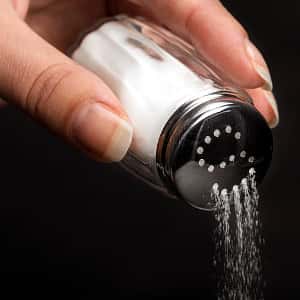
Should you be reducing your sodium intake? Along with regular exercise, public health experts usually recommend a low-sodium diet as a way to control blood pressure and reduce the risk of cardiovascular disease. While it makes a lot of sense to avoid the high sodium levels found in most processed food, it is possible to be overzealous about avoiding sodium.
Hazards of a Low Sodium Diet:
Q. Years ago, a friend of mine was put on a low sodium diet as a general precaution. Prior to this, he was in good health. He became so dizzy that he had to hold on to the walls to move around his house.
His doctors were confounded and ran lots of tests, but they ignored the results: he had extremely low sodium. They told him to keep avoiding salt.
His condition worsened and he became nearly house-bound. When his daughter, a cardiac care nurse, came to visit, she was alarmed. She took him to her physician who was shocked at his low sodium level and put him back on salt. Within days, he was up and about. As a result, I’m skeptical about medical advice to avoid salt!
Getting Sodium Intake Just Right:
A. While high sodium is dangerous, low sodium levels can also be life threatening. Extreme salt restriction from overdoing a low sodium diet may be as dangerous as excessive salt intake (American Journal of Hypertension, online, March 20, 2014), and CDC recommendations for salt intake appear to be too low. People with heart failure are always urged to restrict their sodium intake, but research suggests that those who do so are more likely to need hospitalization or even to die (JACC. Heart Failure, Jan., 2016).
Finding the sweet spot between too little and too much is important. This may require closer attention than most of us pay to our sodium consumption.
It’s Easy to Get Too Much Sodium:
Soozi, for example, tells about her experience:
“I used to work in an office. I was a busy working person. I often ate food prepared by others (tuna sandwiches on white bread…) and the amount of sodium added to my food was probably astronomical. I had no way of knowing. My BP was high and I was on medication for years. If people eat processed food or food prepared by restaurants, their sodium intake is probably very high. As soon as I stopped working, started reading labels and preparing my own food, my blood pressure went back to normal with no medication. I’m sure I stumble on plenty of sodium by accident throughout my days, because every now and then I eat in restaurants or have pizza or other take out.
“I’m convinced that people need to watch what they eat. If the general population cooks their own food, then the 1,500 mg guidelines may be low. If the general population eats fast food periodically, processed food daily and in restaurants once in awhile, then their sodium/salt intake is probably quite high and there is no way to know for sure. If you look at the ingredients in the big salads served in some of the top chain restaurants, it is easy to exceed 1,500 milligrams of sodium, while hoping to eat responsibly.
“Just one small example: Most jars of tomato sauce have hundreds of milligrams of sodium per serving and who really eats only one serving as measured on the jar label? Add that to a few other items throughout the day and whoops!
“I’m just saying, if your goal is 1,500 mg, it is easy to far exceed that without even knowing it.”
How Much Sodium Is the Right Amount?
Soozi’s point is well taken. The research suggests, however, that for most people pursuing a low sodium diet goal of 1500 mg/day is not only unrealistic but potentially unhealthy. Some scientists suggest that the actual sodium goal may need to be tailored to individual needs; they also call for more research to determine “the true impact” of a low sodium diet for people with heart failure (Current Treatment Options in Cardiovascular Medicine, Feb., 2014). We would welcome such studies.
Revised 12/5/2016

